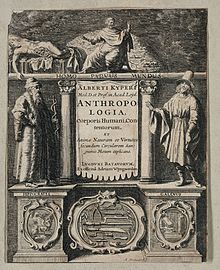Albert Kyper
Albert Kyper also: Albertus Kiper Albertus Kijper, Cuperus, Cyperus ; (* 1614 in Königsberg (Prussia) ; † September 15, 1655 in Leiden ) was a German physician.
Life
Kyper had attended school in Kneiphof and, at the age of eighteen, enrolled at the University of Königsberg on May 21, 1632 , and began studying the philosophical sciences. Apparently he got a master's degree in philosophy there. The situation in Germany during the Thirty Years War prompted him to flee to the Netherlands. On June 30, 1638, he enrolled at the University of Leiden as a medical student. Here he received his doctorate in medicine in 1640 with the treatise De lue venera . From 1643 he was allowed to hold lectures on physics at the Leiden University as a private lecturer. Kyper was a follower of the old school, an admirer of Aristotle and Galen , in which context his work Institutiones physicae originated.
In 1646 he went to the Illustre grammar school in Breda as a professor of physics and medicine , which he took up on September 19 with an Oratio Inaugualis and became Prince Frederik Hendrik's personal physician. On June 8, 1650 he became professor of medicine at the University of Leiden. Here he taught general pathology, therapy, special pathology and medicine. With his professorship he had also taken over the management of the Leiden University Clinic. After he had also participated in the organizational tasks of the Leiden University as rector of the Alma Mater in 1655, he died of the plague that was rampant in Leiden at the time.
His daughter Elisabeth came from his marriage to Catharina van Lyndershausen and married Sebastian Schelkens (1635–1700), a grammar school professor in 's-Hertogenbosch. His son Gerardus (* 1652) studied on March 15, 1673 at the University of Leiden.
Works
- Disp. de igne elementary. 1634.
- Disp. de Cometis. 1636.
- Disp. de fulmine, quod a 1636… turrim nitrariam aulicam Regiomonti percussit. 1637.
- Medicinam rite discendi et discendi et exercendi Methodus. Here. de Vogel, Leiden 1643.
- Oratio inauguralis, in Inauguratio illustris Scholae ac illustris Collegii Auriaci, a celsissimo potentissimoque Arausionensium Principe Frederico Henrico in Urbe Bredana erectorum cum Orationibus Solemnibus ipsâ Inaugurationis die et segq. aliquot habitis, Breda, Joannes à Waesberge, pp. 127-150.
- Institutiones Physicae. Leiden, Adriani a Wijngaerden, 1645 ( online ), 1646 ( online ).
- Anthropologia corporis humani contentorum, et animae naturam et virtutes secundum circularem sanguinis motum explicans. Leiden, Adr. À Wijngaerden, 1647, 1650, 1660. ( Online ), Amsterdam 1665.
- Disputationes politicae de origine et jure magistratus, Collegium medicum disputationibus XXVIbreviter complectens, quae ad institutiones pertinent. 1654, 1666.
- Institutiones Medicinae ad hypothesin de circulari sanguinis motu compositae. Subjunguntur ejurdem Transsumpta Medica, quibus continentur Medicinae Fundamenta. Amsterdam, Joh. Janssonius, 1654 ( online ).
- Collegium medicum, XXVI disputationibus breviter complectens quae ad institutions pertinent. Leiden 1654, Nijmegen 1666.
- Disputationes Physico-Medicae, Miscellaneae, atque Politicae de origine et jure Magistratus, de jure belli et de foederibus. Leiden, Johan Meijer, 1655.
literature
- Kyperus, Albert. In: Johann Heinrich Zedler : Large complete universal lexicon of all sciences and arts . Volume 15, Leipzig 1737, column 2112.
- August Hirsch , Ernst Julius Gurlt : Biographical lexicon of the outstanding doctors of all times and peoples. Urban & Schwarzenberg, Vienna and Leipzig 1886, Vol. 3, p. 472.
- Evert Dirk Baumann : KIJPER (Albert) . In: Petrus Johannes Blok , Philipp Christiaan Molhuysen (Ed.): Nieuw Nederlandsch Biografisch Woordenboek . Part 7. N. Israel, Amsterdam 1974, Sp. 732 (Dutch, knaw.nl / dbnl.org - first edition: AW Sijthoff, Leiden 1927, reprint unchanged).
- Abraham Jacob van der Aa : Biographical Woordenboek der Nederlanden. Verlag JJ van Brederode, Haarlem, 1862, Vol. 10, p. 449. ( Online )
Individual evidence
- ↑ Georg Erler: The matriculation and doctoral registers of the Albertus University in Königsberg i. Pr. 1976, p. 641 and IXXVI
- ^ G. du Rieu: Album studiosorum Academiae Lugduno-Batavae 1575-1875. Martin Nijhoff, The Hague, 1875, p. 296
- ^ CA Siegenbeek van Heukelom-Lamme: Album Scholasticum Academiae Lugduno-batave. Brill Archive, Leiden, 1941, p. 94
- ^ G. du Rieu: Album studiosorum Academiae Lugduno-Batavae 1575-1875. Martin Nijhoff, The Hague, 1875, Sp 513 U. 582
| personal data | |
|---|---|
| SURNAME | Kyper, Albert |
| ALTERNATIVE NAMES | Kiper, Albertus; Kijper, Albertus; Cuperus, Albertus; Cyperus, Albertus |
| BRIEF DESCRIPTION | German medic |
| DATE OF BIRTH | 1614 |
| PLACE OF BIRTH | Königsberg (Prussia) |
| DATE OF DEATH | September 15, 1655 |
| Place of death | Suffer |

